Understanding Motivation: Factors in the Modern World of Work
VerifiedAdded on 2023/06/14
|8
|2009
|487
Report
AI Summary
This report delves into the multifaceted world of work, examining the key factors that motivate employees and influence their job roles. It identifies elements such as job security, appreciation, positive work culture, and competitive wages as significant motivators, highlighting their impact on employee satisfaction and productivity. The report also addresses the importance of leadership styles, growth opportunities, flexible work schedules, and open communication in fostering a motivated workforce. Furthermore, it analyzes both positive factors like fair policies, a sense of belonging, and respect among coworkers, and negative factors such as poor management, limited creative space, and suboptimal working conditions, which can hinder employee performance. The study concludes by emphasizing the need for organizations to create a supportive and engaging environment to maximize employee motivation and overall productivity, and it is a valuable resource for understanding the dynamics of employee motivation and workplace performance.
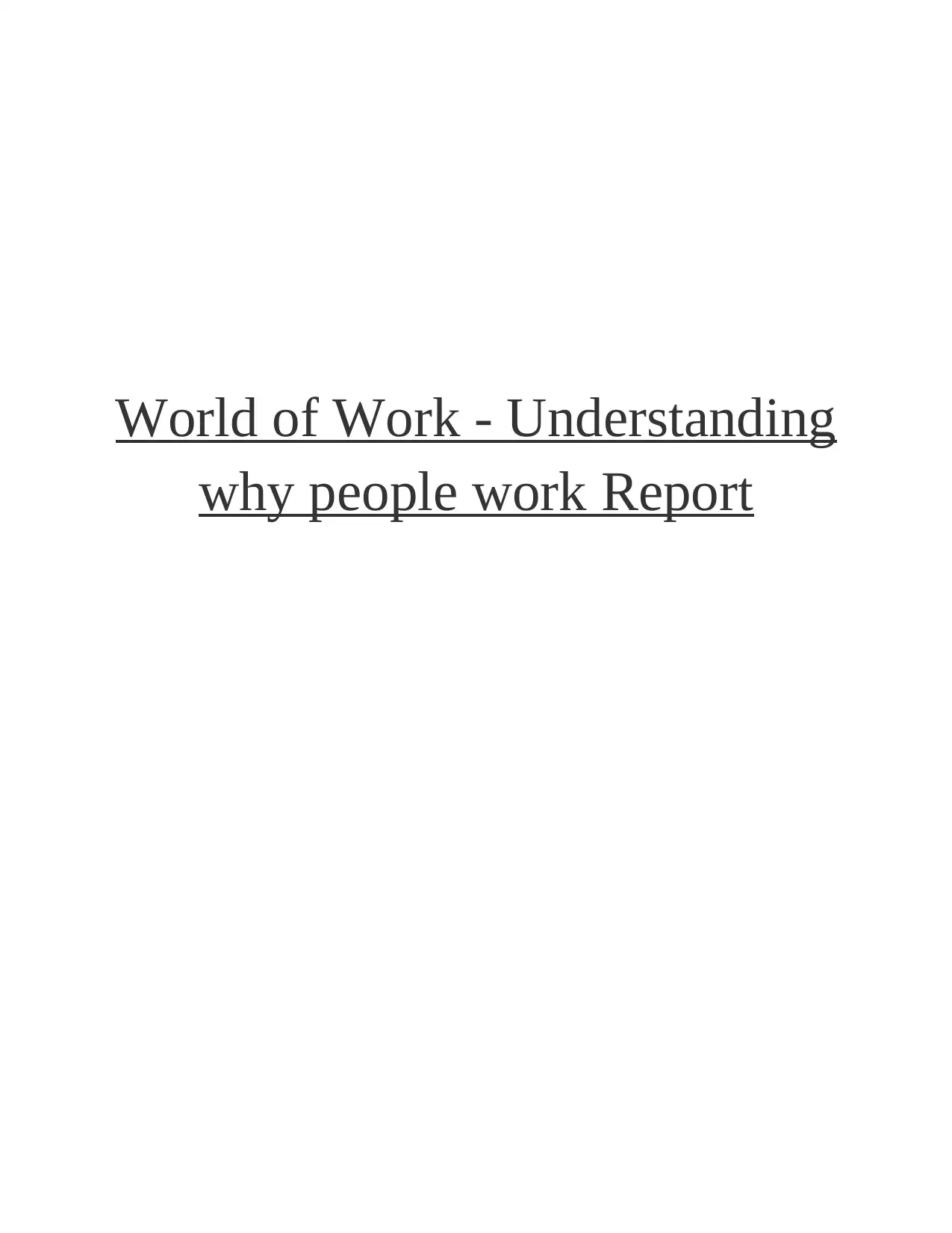
World of Work - Understanding
why people work Report
why people work Report
Paraphrase This Document
Need a fresh take? Get an instant paraphrase of this document with our AI Paraphraser
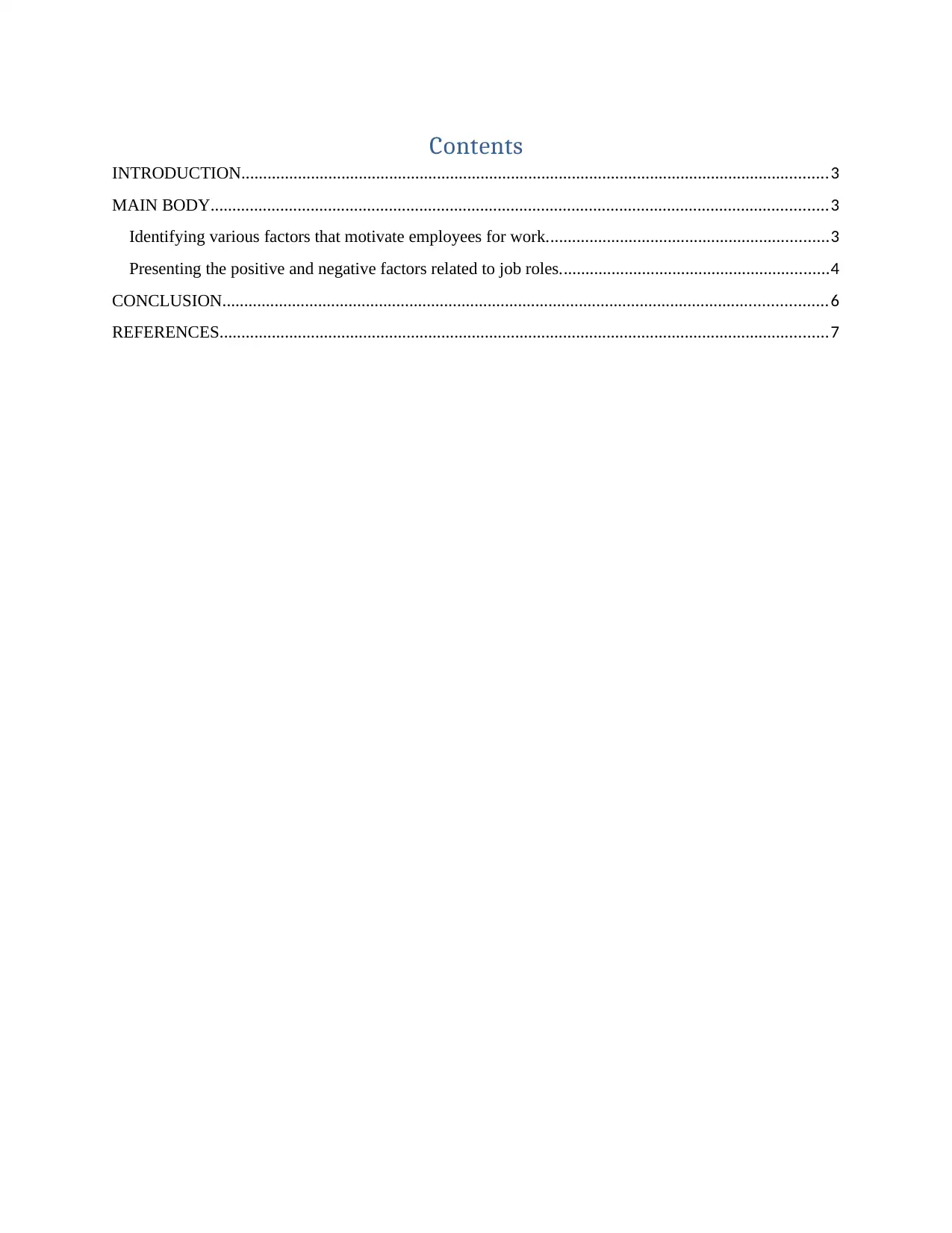
Contents
INTRODUCTION.......................................................................................................................................3
MAIN BODY..............................................................................................................................................3
Identifying various factors that motivate employees for work.................................................................3
Presenting the positive and negative factors related to job roles..............................................................4
CONCLUSION...........................................................................................................................................6
REFERENCES............................................................................................................................................7
INTRODUCTION.......................................................................................................................................3
MAIN BODY..............................................................................................................................................3
Identifying various factors that motivate employees for work.................................................................3
Presenting the positive and negative factors related to job roles..............................................................4
CONCLUSION...........................................................................................................................................6
REFERENCES............................................................................................................................................7
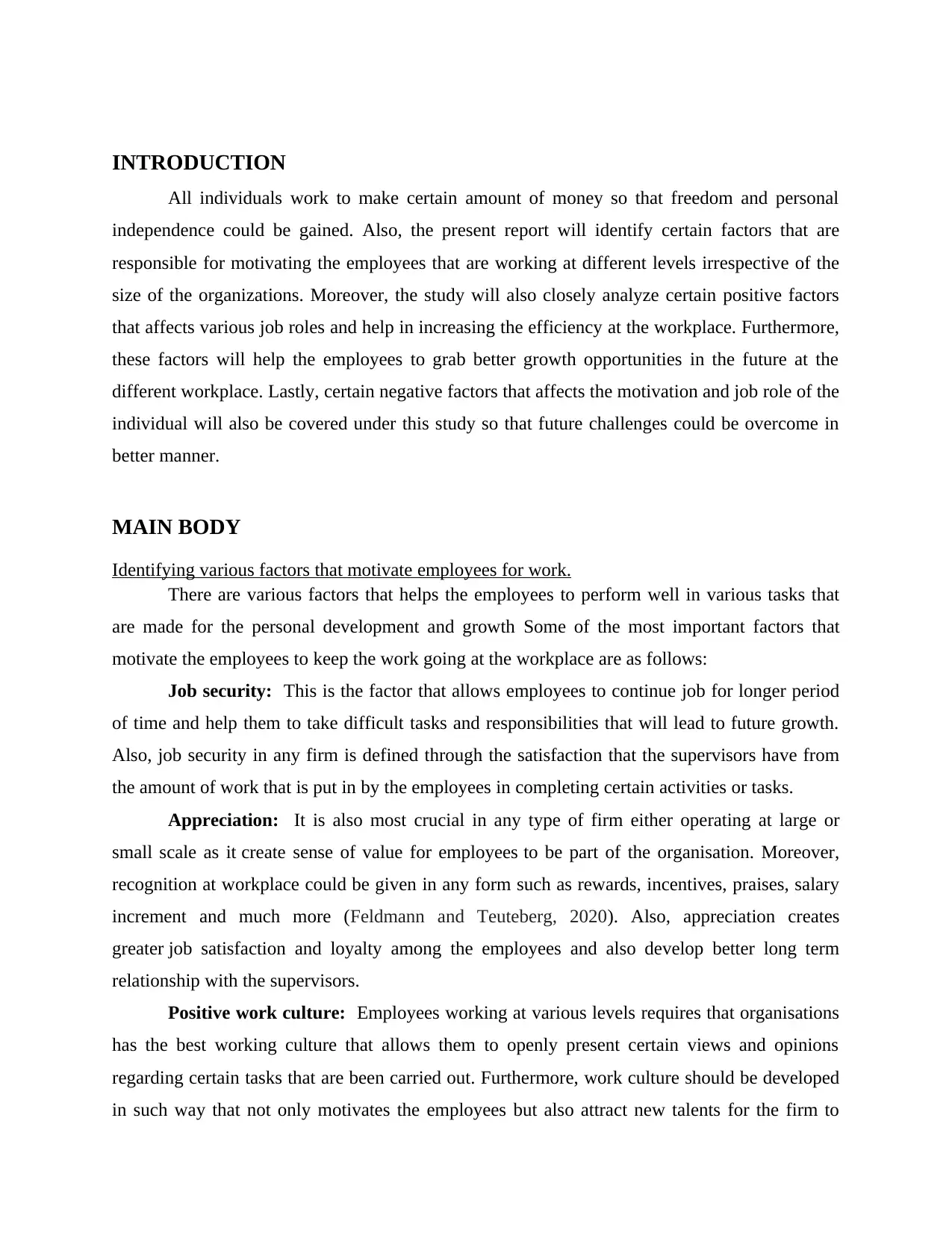
INTRODUCTION
All individuals work to make certain amount of money so that freedom and personal
independence could be gained. Also, the present report will identify certain factors that are
responsible for motivating the employees that are working at different levels irrespective of the
size of the organizations. Moreover, the study will also closely analyze certain positive factors
that affects various job roles and help in increasing the efficiency at the workplace. Furthermore,
these factors will help the employees to grab better growth opportunities in the future at the
different workplace. Lastly, certain negative factors that affects the motivation and job role of the
individual will also be covered under this study so that future challenges could be overcome in
better manner.
MAIN BODY
Identifying various factors that motivate employees for work.
There are various factors that helps the employees to perform well in various tasks that
are made for the personal development and growth Some of the most important factors that
motivate the employees to keep the work going at the workplace are as follows:
Job security: This is the factor that allows employees to continue job for longer period
of time and help them to take difficult tasks and responsibilities that will lead to future growth.
Also, job security in any firm is defined through the satisfaction that the supervisors have from
the amount of work that is put in by the employees in completing certain activities or tasks.
Appreciation: It is also most crucial in any type of firm either operating at large or
small scale as it create sense of value for employees to be part of the organisation. Moreover,
recognition at workplace could be given in any form such as rewards, incentives, praises, salary
increment and much more (Feldmann and Teuteberg, 2020). Also, appreciation creates
greater job satisfaction and loyalty among the employees and also develop better long term
relationship with the supervisors.
Positive work culture: Employees working at various levels requires that organisations
has the best working culture that allows them to openly present certain views and opinions
regarding certain tasks that are been carried out. Furthermore, work culture should be developed
in such way that not only motivates the employees but also attract new talents for the firm to
All individuals work to make certain amount of money so that freedom and personal
independence could be gained. Also, the present report will identify certain factors that are
responsible for motivating the employees that are working at different levels irrespective of the
size of the organizations. Moreover, the study will also closely analyze certain positive factors
that affects various job roles and help in increasing the efficiency at the workplace. Furthermore,
these factors will help the employees to grab better growth opportunities in the future at the
different workplace. Lastly, certain negative factors that affects the motivation and job role of the
individual will also be covered under this study so that future challenges could be overcome in
better manner.
MAIN BODY
Identifying various factors that motivate employees for work.
There are various factors that helps the employees to perform well in various tasks that
are made for the personal development and growth Some of the most important factors that
motivate the employees to keep the work going at the workplace are as follows:
Job security: This is the factor that allows employees to continue job for longer period
of time and help them to take difficult tasks and responsibilities that will lead to future growth.
Also, job security in any firm is defined through the satisfaction that the supervisors have from
the amount of work that is put in by the employees in completing certain activities or tasks.
Appreciation: It is also most crucial in any type of firm either operating at large or
small scale as it create sense of value for employees to be part of the organisation. Moreover,
recognition at workplace could be given in any form such as rewards, incentives, praises, salary
increment and much more (Feldmann and Teuteberg, 2020). Also, appreciation creates
greater job satisfaction and loyalty among the employees and also develop better long term
relationship with the supervisors.
Positive work culture: Employees working at various levels requires that organisations
has the best working culture that allows them to openly present certain views and opinions
regarding certain tasks that are been carried out. Furthermore, work culture should be developed
in such way that not only motivates the employees but also attract new talents for the firm to
⊘ This is a preview!⊘
Do you want full access?
Subscribe today to unlock all pages.

Trusted by 1+ million students worldwide
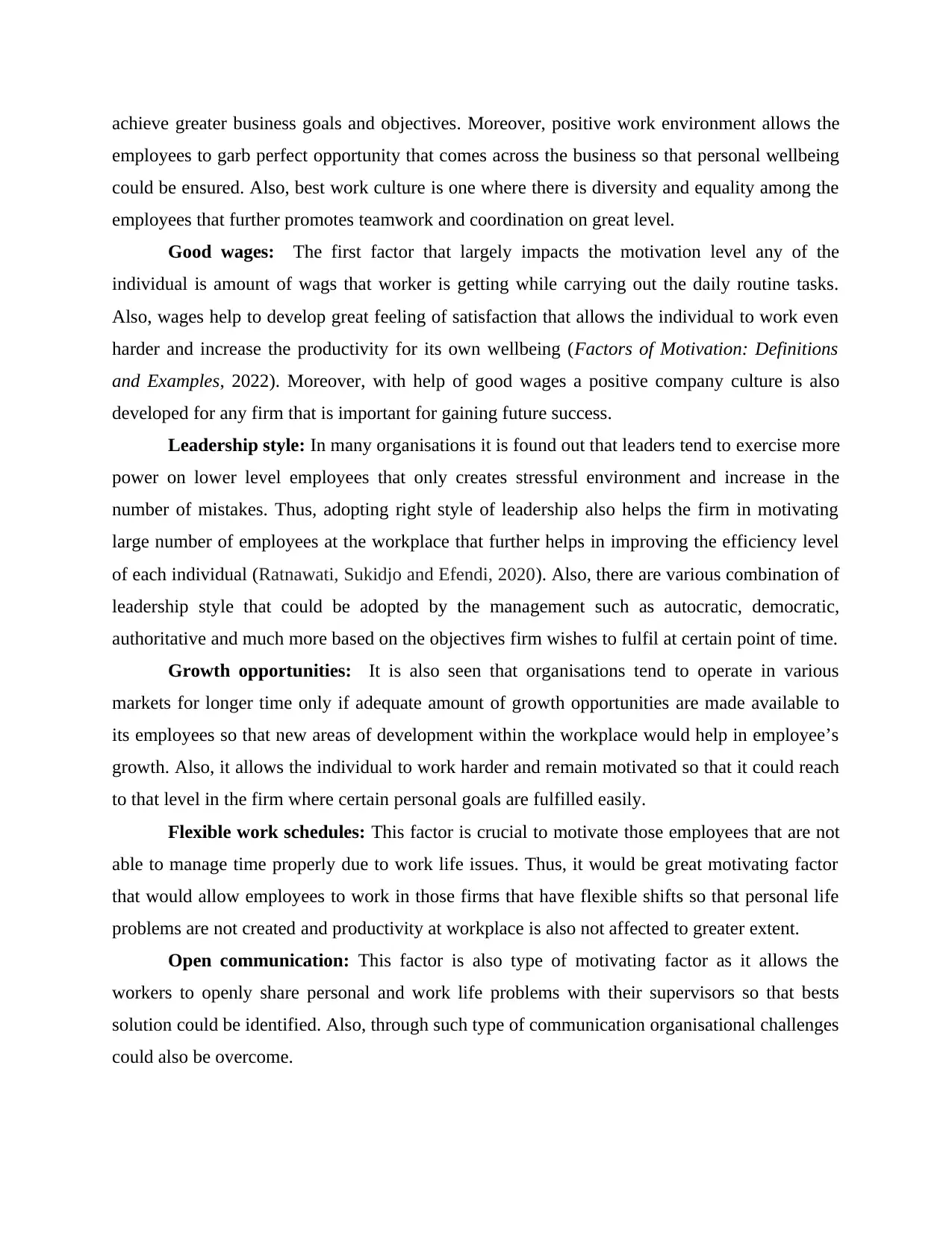
achieve greater business goals and objectives. Moreover, positive work environment allows the
employees to garb perfect opportunity that comes across the business so that personal wellbeing
could be ensured. Also, best work culture is one where there is diversity and equality among the
employees that further promotes teamwork and coordination on great level.
Good wages: The first factor that largely impacts the motivation level any of the
individual is amount of wags that worker is getting while carrying out the daily routine tasks.
Also, wages help to develop great feeling of satisfaction that allows the individual to work even
harder and increase the productivity for its own wellbeing (Factors of Motivation: Definitions
and Examples, 2022). Moreover, with help of good wages a positive company culture is also
developed for any firm that is important for gaining future success.
Leadership style: In many organisations it is found out that leaders tend to exercise more
power on lower level employees that only creates stressful environment and increase in the
number of mistakes. Thus, adopting right style of leadership also helps the firm in motivating
large number of employees at the workplace that further helps in improving the efficiency level
of each individual (Ratnawati, Sukidjo and Efendi, 2020). Also, there are various combination of
leadership style that could be adopted by the management such as autocratic, democratic,
authoritative and much more based on the objectives firm wishes to fulfil at certain point of time.
Growth opportunities: It is also seen that organisations tend to operate in various
markets for longer time only if adequate amount of growth opportunities are made available to
its employees so that new areas of development within the workplace would help in employee’s
growth. Also, it allows the individual to work harder and remain motivated so that it could reach
to that level in the firm where certain personal goals are fulfilled easily.
Flexible work schedules: This factor is crucial to motivate those employees that are not
able to manage time properly due to work life issues. Thus, it would be great motivating factor
that would allow employees to work in those firms that have flexible shifts so that personal life
problems are not created and productivity at workplace is also not affected to greater extent.
Open communication: This factor is also type of motivating factor as it allows the
workers to openly share personal and work life problems with their supervisors so that bests
solution could be identified. Also, through such type of communication organisational challenges
could also be overcome.
employees to garb perfect opportunity that comes across the business so that personal wellbeing
could be ensured. Also, best work culture is one where there is diversity and equality among the
employees that further promotes teamwork and coordination on great level.
Good wages: The first factor that largely impacts the motivation level any of the
individual is amount of wags that worker is getting while carrying out the daily routine tasks.
Also, wages help to develop great feeling of satisfaction that allows the individual to work even
harder and increase the productivity for its own wellbeing (Factors of Motivation: Definitions
and Examples, 2022). Moreover, with help of good wages a positive company culture is also
developed for any firm that is important for gaining future success.
Leadership style: In many organisations it is found out that leaders tend to exercise more
power on lower level employees that only creates stressful environment and increase in the
number of mistakes. Thus, adopting right style of leadership also helps the firm in motivating
large number of employees at the workplace that further helps in improving the efficiency level
of each individual (Ratnawati, Sukidjo and Efendi, 2020). Also, there are various combination of
leadership style that could be adopted by the management such as autocratic, democratic,
authoritative and much more based on the objectives firm wishes to fulfil at certain point of time.
Growth opportunities: It is also seen that organisations tend to operate in various
markets for longer time only if adequate amount of growth opportunities are made available to
its employees so that new areas of development within the workplace would help in employee’s
growth. Also, it allows the individual to work harder and remain motivated so that it could reach
to that level in the firm where certain personal goals are fulfilled easily.
Flexible work schedules: This factor is crucial to motivate those employees that are not
able to manage time properly due to work life issues. Thus, it would be great motivating factor
that would allow employees to work in those firms that have flexible shifts so that personal life
problems are not created and productivity at workplace is also not affected to greater extent.
Open communication: This factor is also type of motivating factor as it allows the
workers to openly share personal and work life problems with their supervisors so that bests
solution could be identified. Also, through such type of communication organisational challenges
could also be overcome.
Paraphrase This Document
Need a fresh take? Get an instant paraphrase of this document with our AI Paraphraser
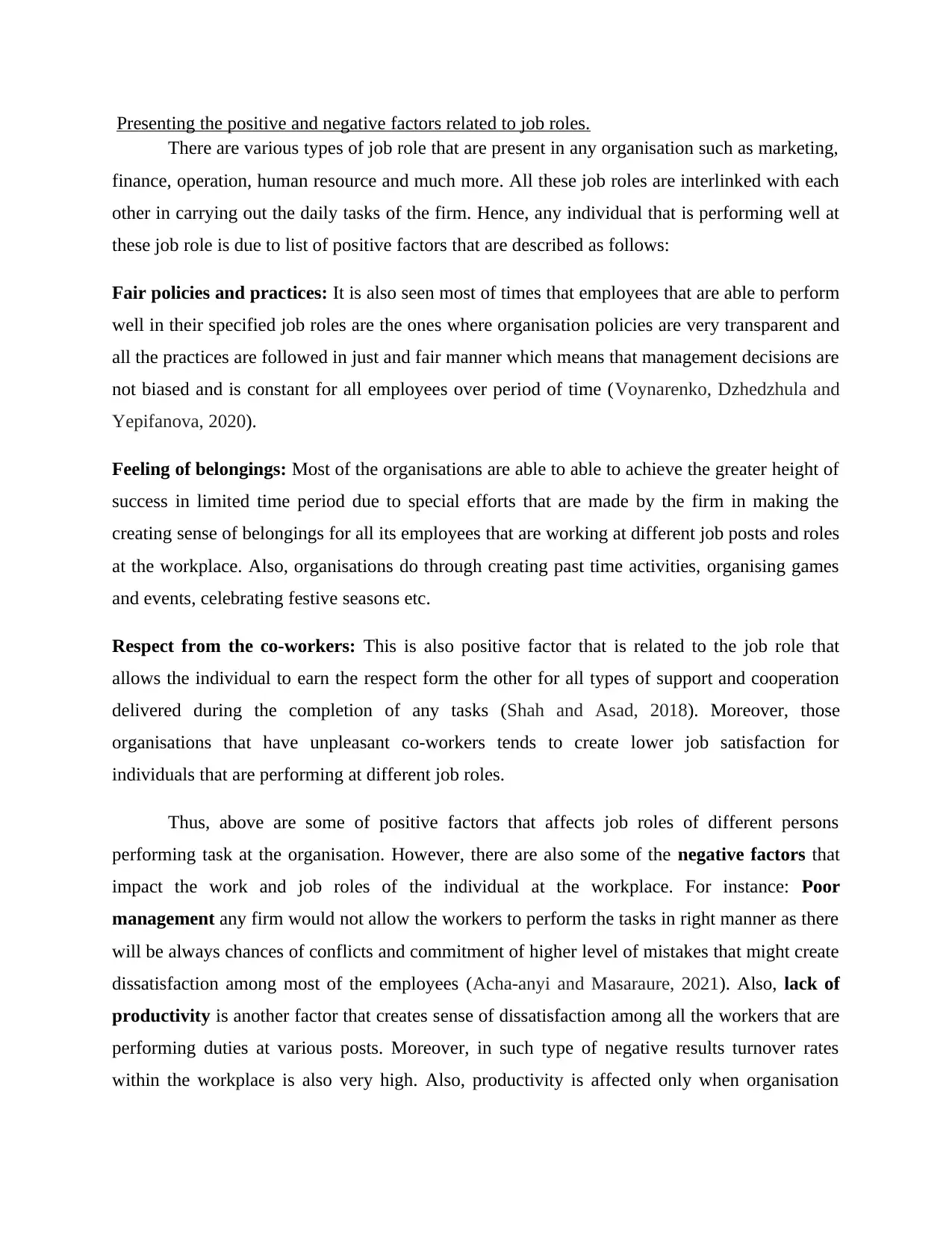
Presenting the positive and negative factors related to job roles.
There are various types of job role that are present in any organisation such as marketing,
finance, operation, human resource and much more. All these job roles are interlinked with each
other in carrying out the daily tasks of the firm. Hence, any individual that is performing well at
these job role is due to list of positive factors that are described as follows:
Fair policies and practices: It is also seen most of times that employees that are able to perform
well in their specified job roles are the ones where organisation policies are very transparent and
all the practices are followed in just and fair manner which means that management decisions are
not biased and is constant for all employees over period of time (Voynarenko, Dzhedzhula and
Yepifanova, 2020).
Feeling of belongings: Most of the organisations are able to able to achieve the greater height of
success in limited time period due to special efforts that are made by the firm in making the
creating sense of belongings for all its employees that are working at different job posts and roles
at the workplace. Also, organisations do through creating past time activities, organising games
and events, celebrating festive seasons etc.
Respect from the co-workers: This is also positive factor that is related to the job role that
allows the individual to earn the respect form the other for all types of support and cooperation
delivered during the completion of any tasks (Shah and Asad, 2018). Moreover, those
organisations that have unpleasant co-workers tends to create lower job satisfaction for
individuals that are performing at different job roles.
Thus, above are some of positive factors that affects job roles of different persons
performing task at the organisation. However, there are also some of the negative factors that
impact the work and job roles of the individual at the workplace. For instance: Poor
management any firm would not allow the workers to perform the tasks in right manner as there
will be always chances of conflicts and commitment of higher level of mistakes that might create
dissatisfaction among most of the employees (Acha-anyi and Masaraure, 2021). Also, lack of
productivity is another factor that creates sense of dissatisfaction among all the workers that are
performing duties at various posts. Moreover, in such type of negative results turnover rates
within the workplace is also very high. Also, productivity is affected only when organisation
There are various types of job role that are present in any organisation such as marketing,
finance, operation, human resource and much more. All these job roles are interlinked with each
other in carrying out the daily tasks of the firm. Hence, any individual that is performing well at
these job role is due to list of positive factors that are described as follows:
Fair policies and practices: It is also seen most of times that employees that are able to perform
well in their specified job roles are the ones where organisation policies are very transparent and
all the practices are followed in just and fair manner which means that management decisions are
not biased and is constant for all employees over period of time (Voynarenko, Dzhedzhula and
Yepifanova, 2020).
Feeling of belongings: Most of the organisations are able to able to achieve the greater height of
success in limited time period due to special efforts that are made by the firm in making the
creating sense of belongings for all its employees that are working at different job posts and roles
at the workplace. Also, organisations do through creating past time activities, organising games
and events, celebrating festive seasons etc.
Respect from the co-workers: This is also positive factor that is related to the job role that
allows the individual to earn the respect form the other for all types of support and cooperation
delivered during the completion of any tasks (Shah and Asad, 2018). Moreover, those
organisations that have unpleasant co-workers tends to create lower job satisfaction for
individuals that are performing at different job roles.
Thus, above are some of positive factors that affects job roles of different persons
performing task at the organisation. However, there are also some of the negative factors that
impact the work and job roles of the individual at the workplace. For instance: Poor
management any firm would not allow the workers to perform the tasks in right manner as there
will be always chances of conflicts and commitment of higher level of mistakes that might create
dissatisfaction among most of the employees (Acha-anyi and Masaraure, 2021). Also, lack of
productivity is another factor that creates sense of dissatisfaction among all the workers that are
performing duties at various posts. Moreover, in such type of negative results turnover rates
within the workplace is also very high. Also, productivity is affected only when organisation
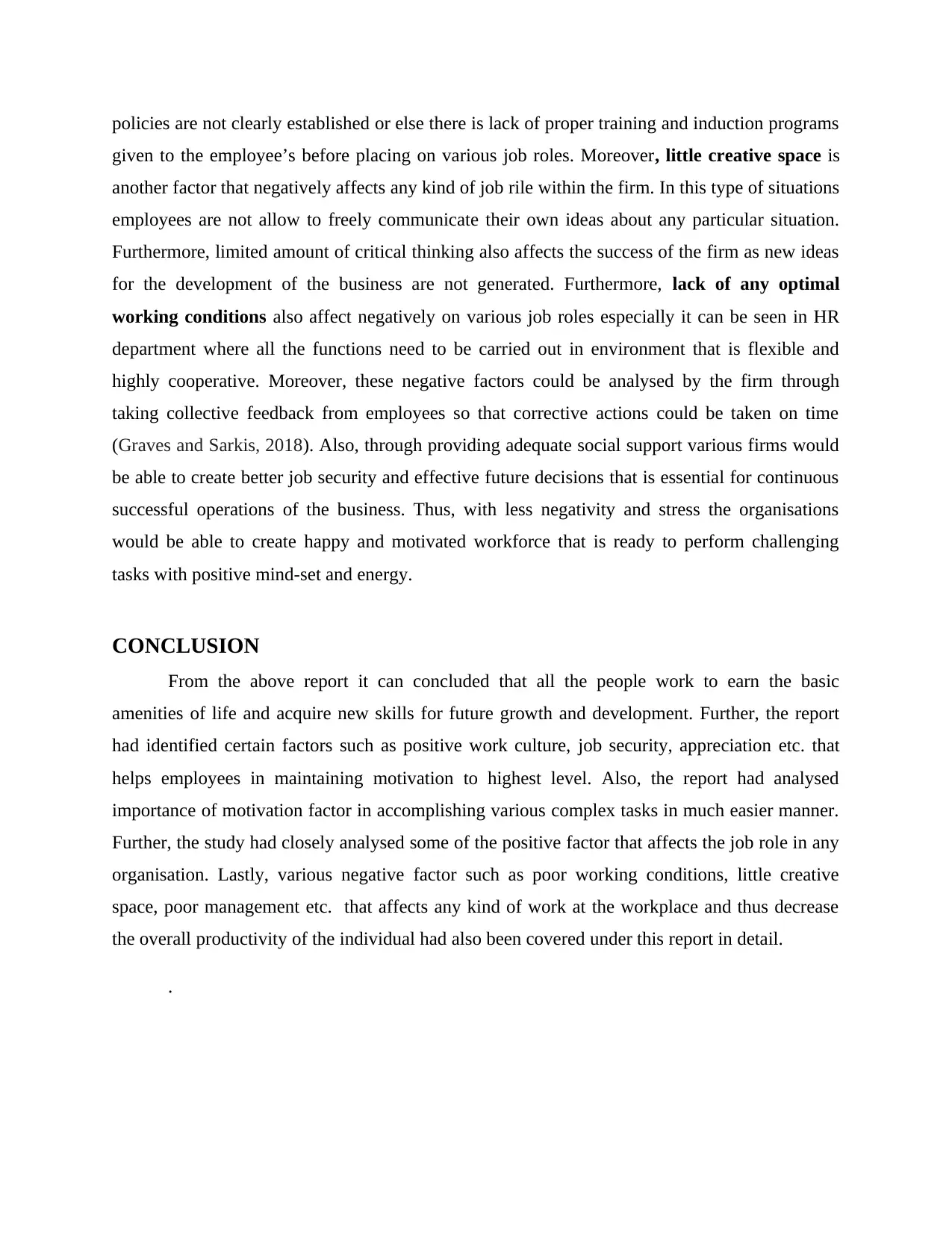
policies are not clearly established or else there is lack of proper training and induction programs
given to the employee’s before placing on various job roles. Moreover, little creative space is
another factor that negatively affects any kind of job rile within the firm. In this type of situations
employees are not allow to freely communicate their own ideas about any particular situation.
Furthermore, limited amount of critical thinking also affects the success of the firm as new ideas
for the development of the business are not generated. Furthermore, lack of any optimal
working conditions also affect negatively on various job roles especially it can be seen in HR
department where all the functions need to be carried out in environment that is flexible and
highly cooperative. Moreover, these negative factors could be analysed by the firm through
taking collective feedback from employees so that corrective actions could be taken on time
(Graves and Sarkis, 2018). Also, through providing adequate social support various firms would
be able to create better job security and effective future decisions that is essential for continuous
successful operations of the business. Thus, with less negativity and stress the organisations
would be able to create happy and motivated workforce that is ready to perform challenging
tasks with positive mind-set and energy.
CONCLUSION
From the above report it can concluded that all the people work to earn the basic
amenities of life and acquire new skills for future growth and development. Further, the report
had identified certain factors such as positive work culture, job security, appreciation etc. that
helps employees in maintaining motivation to highest level. Also, the report had analysed
importance of motivation factor in accomplishing various complex tasks in much easier manner.
Further, the study had closely analysed some of the positive factor that affects the job role in any
organisation. Lastly, various negative factor such as poor working conditions, little creative
space, poor management etc. that affects any kind of work at the workplace and thus decrease
the overall productivity of the individual had also been covered under this report in detail.
.
given to the employee’s before placing on various job roles. Moreover, little creative space is
another factor that negatively affects any kind of job rile within the firm. In this type of situations
employees are not allow to freely communicate their own ideas about any particular situation.
Furthermore, limited amount of critical thinking also affects the success of the firm as new ideas
for the development of the business are not generated. Furthermore, lack of any optimal
working conditions also affect negatively on various job roles especially it can be seen in HR
department where all the functions need to be carried out in environment that is flexible and
highly cooperative. Moreover, these negative factors could be analysed by the firm through
taking collective feedback from employees so that corrective actions could be taken on time
(Graves and Sarkis, 2018). Also, through providing adequate social support various firms would
be able to create better job security and effective future decisions that is essential for continuous
successful operations of the business. Thus, with less negativity and stress the organisations
would be able to create happy and motivated workforce that is ready to perform challenging
tasks with positive mind-set and energy.
CONCLUSION
From the above report it can concluded that all the people work to earn the basic
amenities of life and acquire new skills for future growth and development. Further, the report
had identified certain factors such as positive work culture, job security, appreciation etc. that
helps employees in maintaining motivation to highest level. Also, the report had analysed
importance of motivation factor in accomplishing various complex tasks in much easier manner.
Further, the study had closely analysed some of the positive factor that affects the job role in any
organisation. Lastly, various negative factor such as poor working conditions, little creative
space, poor management etc. that affects any kind of work at the workplace and thus decrease
the overall productivity of the individual had also been covered under this report in detail.
.
⊘ This is a preview!⊘
Do you want full access?
Subscribe today to unlock all pages.

Trusted by 1+ million students worldwide
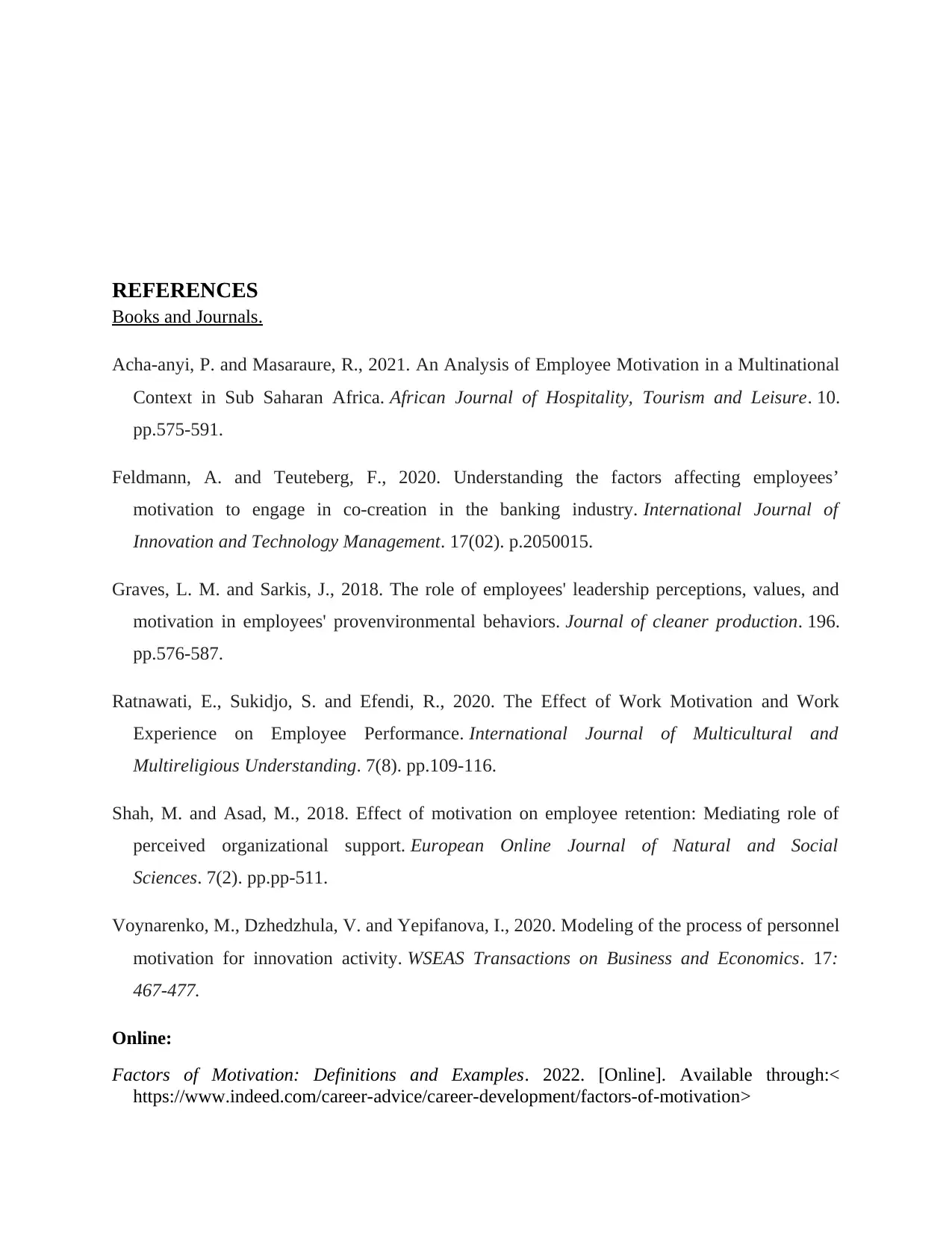
REFERENCES
Books and Journals.
Acha-anyi, P. and Masaraure, R., 2021. An Analysis of Employee Motivation in a Multinational
Context in Sub Saharan Africa. African Journal of Hospitality, Tourism and Leisure. 10.
pp.575-591.
Feldmann, A. and Teuteberg, F., 2020. Understanding the factors affecting employees’
motivation to engage in co-creation in the banking industry. International Journal of
Innovation and Technology Management. 17(02). p.2050015.
Graves, L. M. and Sarkis, J., 2018. The role of employees' leadership perceptions, values, and
motivation in employees' provenvironmental behaviors. Journal of cleaner production. 196.
pp.576-587.
Ratnawati, E., Sukidjo, S. and Efendi, R., 2020. The Effect of Work Motivation and Work
Experience on Employee Performance. International Journal of Multicultural and
Multireligious Understanding. 7(8). pp.109-116.
Shah, M. and Asad, M., 2018. Effect of motivation on employee retention: Mediating role of
perceived organizational support. European Online Journal of Natural and Social
Sciences. 7(2). pp.pp-511.
Voynarenko, M., Dzhedzhula, V. and Yepifanova, I., 2020. Modeling of the process of personnel
motivation for innovation activity. WSEAS Transactions on Business and Economics. 17:
467-477.
Online:
Factors of Motivation: Definitions and Examples. 2022. [Online]. Available through:<
https://www.indeed.com/career-advice/career-development/factors-of-motivation>
Books and Journals.
Acha-anyi, P. and Masaraure, R., 2021. An Analysis of Employee Motivation in a Multinational
Context in Sub Saharan Africa. African Journal of Hospitality, Tourism and Leisure. 10.
pp.575-591.
Feldmann, A. and Teuteberg, F., 2020. Understanding the factors affecting employees’
motivation to engage in co-creation in the banking industry. International Journal of
Innovation and Technology Management. 17(02). p.2050015.
Graves, L. M. and Sarkis, J., 2018. The role of employees' leadership perceptions, values, and
motivation in employees' provenvironmental behaviors. Journal of cleaner production. 196.
pp.576-587.
Ratnawati, E., Sukidjo, S. and Efendi, R., 2020. The Effect of Work Motivation and Work
Experience on Employee Performance. International Journal of Multicultural and
Multireligious Understanding. 7(8). pp.109-116.
Shah, M. and Asad, M., 2018. Effect of motivation on employee retention: Mediating role of
perceived organizational support. European Online Journal of Natural and Social
Sciences. 7(2). pp.pp-511.
Voynarenko, M., Dzhedzhula, V. and Yepifanova, I., 2020. Modeling of the process of personnel
motivation for innovation activity. WSEAS Transactions on Business and Economics. 17:
467-477.
Online:
Factors of Motivation: Definitions and Examples. 2022. [Online]. Available through:<
https://www.indeed.com/career-advice/career-development/factors-of-motivation>
Paraphrase This Document
Need a fresh take? Get an instant paraphrase of this document with our AI Paraphraser

1 out of 8
Related Documents
Your All-in-One AI-Powered Toolkit for Academic Success.
+13062052269
info@desklib.com
Available 24*7 on WhatsApp / Email
![[object Object]](/_next/static/media/star-bottom.7253800d.svg)
Unlock your academic potential
Copyright © 2020–2025 A2Z Services. All Rights Reserved. Developed and managed by ZUCOL.




